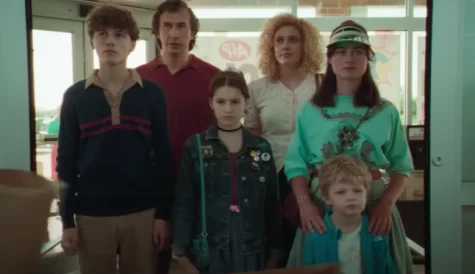What Can the Movie “White Noise” Teach Us About Death?
January 13, 2023
 Death is inevitable. We all know this is true. Even so, why do we as human beings try to find ways to not only avoid it, but explain it, as if grasping the concept will make us immortal?
Death is inevitable. We all know this is true. Even so, why do we as human beings try to find ways to not only avoid it, but explain it, as if grasping the concept will make us immortal?
A new movie has recently come out on Netflix directed by Noah Baumbach based upon a book written by Don DeLillo called White Noise. Along with themes of the pitfalls of consumerism, this story speculates on the fear of mortality and a family’s attempt to control it.
I enjoy watching movies that appear chaotic and insane on the surface, and then – like some of the characters in this film – overanalyzing what just took place and trying to make sense of the last two hours of my life. White Noise is one of those movies.
Set in the skin of the 1980’s, the film focuses on a seemingly regular middle class, white family. The father, Jack Gladney, is played by Adam Driver and the wife, Babette Gladney, is played by Greta Gurwig. They have a slew of kids from previous marriages and one from their own. Throughout the film they are faced with obstacles such as “The Airborne Toxic Event” which puts the family in a situation where they must face the reality that one of them may die.
The movie begins quite regularly, watching the family interact through their daily lives. Jack Gladney works at a university teaching Hitler studies which consumes a large part of his life. Because his field of study is deeply rooted in the past, he speaks on death a lot, but it is usually romanticized by large words and an overzealous educator’s eyes. Both him and his colleague, Murray Siskind, played by Don Cheadle, are seen near the beginning of this film performing a lecture on Elvis and Hitler, and how the two powerful men died. This serves as an example on how they both dress up death, and use their fields as distractions from their actual fears of mortality.
The next incident that occurred, and probably the most chaotic and action packed part of the movie, would be “The Airborne Toxic Event.” In this part of the story, the fear of mortality is now at the forefront of the entire family’s minds, as a railroad accident results in a chemical spill that releases a large, black cloud of toxins. Information on what everyone should do and how it will affect those exposed to it is very limited and not well communicated. The family ends up evacuating and eventually has to stop for gas where Jack is exposed to the toxins and told when they are in a bunker that he may live or he may die, the effects were still unclear. He keeps this information from his family and it soon consumes his thoughts. Even though death was something he was aware of, it had now become a reality. The fear of not knowing when death will come guides him through the last part of the movie.
Aside from Jack, his wife, Babette, is experiencing these fears as well. Throughout the entire film she is taking a pill that will help her cope with her fear of death or in a way forget it, though, it doesn’t actually work. The pill comes with damaging side effects including mistaking words for reality and memory loss. Her fear of death, though she has no reason to think that will happen any time soon, infringes on how she interacts with her family and ends up affecting those around her in a negative way. They worry about her memory loss and increased self isolation caused by the pills. She tries to hold onto hope that the pills may work, but she knows that they won’t. In the end, the only cure for her fear is confiding in her husband and accepting that death is a part of life.
Death is a subject that many people struggle to understand and cope with. Whether you have just lost a loved one or can’t stop thinking about “what comes next?” it plagues the mind and is hard to shake. A very important lesson we can learn from this story is to not let that fear stifle you from experiencing life. There are many interpretations on why we are here and what our purpose must be, but I believe that we were given life to do just that, live.
